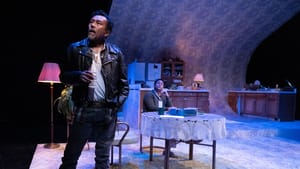Stay in the Loop
BSR publishes on a weekly schedule, with an email newsletter every Wednesday and Thursday morning. There’s no paywall, and subscribing is always free.
East meets West
People’s Light presents Sam Shepard’s True West

Sam Shepard constructed a powder keg of familial recriminations in True West, his most approachable and entertaining mainstream play. Yet the combustible components fail to ignite in People’s Light’s intriguing but undercooked new production. Instead, the drama reaches a bare simmer, while the outrageously humorous elements that pepper Shepard’s tale of two brothers at psychological war with each other and their own past barely register.
Although Shepard established himself as one of the great chroniclers of the post-modern Western ethos before his death in 2017, he invokes that space ironically in the title here. True West takes place in suburban Southern California, a long-settled stretch of a formerly wild country, and the central characters are cowboys only in their own minds. Austin (Sanjit De Silva) is a semi-successful screenwriter—a respectable, married family man—while Lee (Ron Domingo) is a small-time cat burglar, pilfering the television sets from the neighbors on his mother’s cul-de-sac.
The men talk a big game about the mythic past—and their own complicated history—but at their core, they are remarkable only in their own fractious ties to each other. Lee is the id to Austin’s ego, different sides of the same coin. They amplify the parts that scare them most: terrorizing uncertainty on one hand, stultifying conformity on the other.
A seamless concept for Shepard’s California
In this staging, directed by Mei Ann Teo, they are also Asian. The choice blends seamlessly with Shepard’s conception of California, where members of the Asian diaspora have resided up and down the coast for more than two centuries, contributing to the formation of the region’s culture even as they faced exclusion, internment, and racism. The conception brands Lee and Austin as integral and other, an additional layer in an already deeply knit history.
What Teo and their actors don’t deliver, however, is a sense of the rich, complicated history between the characters that drives them to make destructive choices. At its best, the play functions as a cat-and-mouse game where the brothers trade off the upper hand, absorbing elements of each other’s identities until their true personalities are rendered almost unrecognizable. Here, they start off and remain fairly flat. There is little sense of backstory in their charged early conversations as Lee tries to suss out the motives that brought Austin back to their childhood home. Domingo’s low-wattage performance generally lacks the necessary sense of menace that both terrifies Austin and draws him into his brother’s thrall.

De Silva convinces in Austin’s milquetoast early moments but struggles to convey the dark shift in his personality caused by his excessive exposure to Lee’s negative influence. In a successful production of this play, the audience should feel the instant when the two characters transfigure, when they fully absorb and swap personalities. Here, because De Silva and Domingo are relatively tame from the beginning, the shift barely registers. This feeling of change can also be achieved through costuming, but Sara Ryung Clement’s sartorial choices hew close to what’s expected for each brother throughout: preppy duds for Austin, ratty flannels for Lee.
Serious distances
Although scenic designer You-Shin Chen delivers a visually striking physical production, it feels out of place with the storytelling. The site of the action, a standard family kitchen, is rendered like a Mobius strip, with cupboards on the ceiling and overstated tchotchkes littered about. This strikes the viewer as self-consciously weird when the story’s deeply troubling subtext depends on the perceived normality of the setting. It’s an aesthetic that would work better in Shepard’s Curse of the Starving Class, a more archly exploded version of the family melodrama.
Projections by Jeanette Oi-Suk Yew add another unnecessarily distancing layer to the proceedings, and the performances of two supporting actors—Greg Watanabe as the duplicitous movie producer Saul and Ching Valdes-Aran as the forbidding Mom to Lee and Austin—come across as stiff and stylized. True West can be a disturbingly funny play, but there’s hardly a laugh to be found in this hyper-serious rendering. Perhaps due to under-rehearsal, the actors rarely nail the rhythms of Shepard’s occasionally hypnotic dialogue.
When Mom returns to her ransacked house and finds her two sons in the grip of a violent brawl, she witheringly observes the futility of their fight: “You’ve done enough damage already,” she says with disgust. In this production of True West, you wish the actors and artisans would do more.
What, When, Where
True West. By Sam Shepard, directed by Mei Ann Teo. $42. Through August 27, 2023, at People’s Light, 39 Conestoga Road, Malvern. (610) 644-3500 or peopleslight.org.
Accessibility
People’s Light is a wheelchair-accessible venue. Patrons with specific ticketing requests can contact the box office at (610) 664-3500. There will be a relaxed performance of True West on Sunday, August 20, at 2pm, and all performances during the week of August 22 will be open captioned. Smart caption glasses, which offer real-time captioning, are available by reservation for all performances beginning August 15.
Sign up for our newsletter
All of the week's new articles, all in one place. Sign up for the free weekly BSR newsletters, and don't miss a conversation.
 Cameron Kelsall
Cameron Kelsall